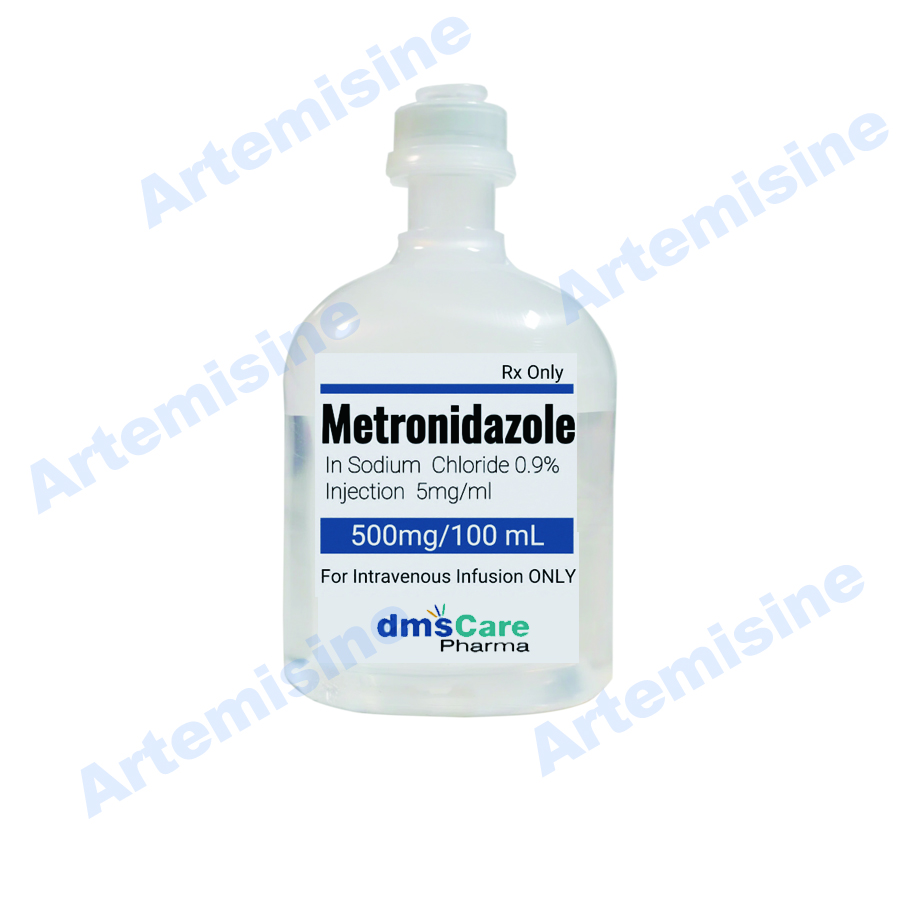Product Description
Products name:
Metronidazole Injection
Dosage:
5mg/ml
Package:
100 ml
What is metronidazole?
Metronidazole is an antibiotic that may be used to treat certain infections of the vagina, stomach, liver, skin, joints, brain and spinal cord, lungs, heart, or bloodstream.
Metronidazole has been approved to treat:
Symptomatic trichomoniasis (a sexually transmitted infection) in adults that has been confirmed by culture or wet smear test
Asymptomatic trichomoniasis in females when associated with cervical changes, and in asymptomatic sexual partners
Amebiasis (an infection caused by a parasite) in adults and children
Anaerobic bacterial infections (infections caused by bacteria that do not need oxygen to survive).
Metronidazole is thought to work by first diffusing into the cytoplasm of the anaerobic bacteria where it is then activated and reduced into a short-lived nitroso free radical which can interact with DNA, causing a loss of the helical DNA structure, strand breakage, and bacterial death.
Metronidazole is well absorbed after oral administration, with peak concentrations being reached in one to two hours. Although it starts to work quickly, it may take a couple of days before you start to feel better or notice an improvement in your symptoms. It is important that you still finish the course of metronidazole that your doctor has prescribed, even if you feel better, because the infection may still be present, and it could flare up or recur if you haven’t finished the course.
Before taking this medicine
You should not use this medicine if you are allergic to metronidazole, secnidazole, or tinidazole, or if you:
drank alcohol in the past 3 days
consumed foods or medicines that contain propylene glycol in the past 3 days or
took disulfiram (Antabuse) within the past 14 days
have Cockayne Syndrome (a rare genetic disorder that affects growth and development).
Before taking metronidazole, tell your healthcare provider about all of your medical conditions, including if you:
liver disease
kidney disease (or if you are on dialysis)
a heart rhythm disorder
a stomach or intestinal disease such as Crohn’s disease
a blood cell disorder such as anemia (lack of red blood cells) or low white blood cell (WBC) counts
medical problems that affect the brain or a nerve disorder
a yeast infection or a fungal infection anywhere in your body
a history of blood problems
or take any medications, especially warfarin, lithium, busulfan, cimetidine, phenytoin, or phenobarbital.
Tell your doctor if you are pregnant or intend to become pregnant. The use of metronidazole during pregnancy has been well-studied and a review of 17 studies found that treating bacterial vaginosis and trichomoniasis with metronidazole reduced the risk of preterm birth and was effective and offered no teratogen risk. Conversely, isolated studies have suggested its use may result in low birth weight or preterm delivery. Talk to your doctor about the risks and benefits of taking metronidazole during pregnancy. Some product labels for metronidazole say it is contraindicated during the first trimester.
Tell your doctor if you are breastfeeding or plan to breastfeed. Metronidazole can pass into your breast milk. Talk to your healthcare provider about the best way to feed your baby while taking metronidazole. If you are breastfeeding, you may consider pumping and throwing away your breast milk during treatment with metronidazole and for 48 hours after your last dose and feeding your infant stored human milk or formula.
Not all uses of metronidazole are approved for treating children and teenagers. Metronidazole is not approved to treat vaginal infections in girls who have not begun having menstrual periods.
